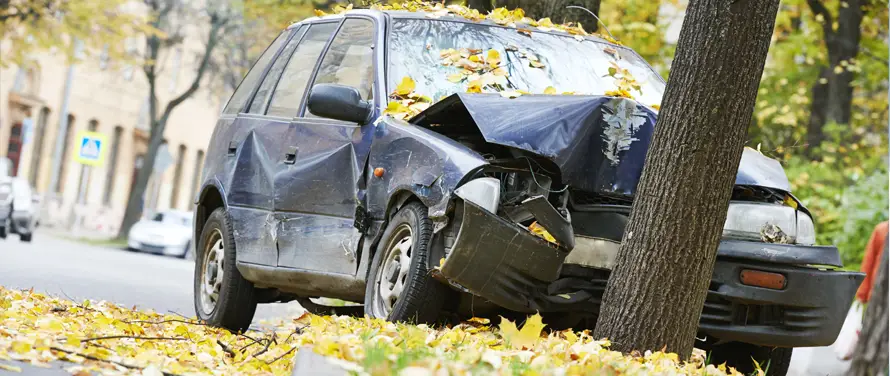Car Accidents: Facts & Legal Help
Car Accidents Car accidents are common. In 2019, the most recent year with data, the U.S. saw nearly 6.8 million car accidents. About 1.9 million
TrafficAccidents.com is a free resource and guide for those who have suffered an injury caused by a traffic accident and don’t how to receive compensation.

An auto accident can happen for many reasons. Weather conditions, road surfaces, and mechanical issues can cause or contribute to a traffic accident.
Some states use a no-fault insurance system. Under this system, the insurance company will not use fault to determine whether you receive benefits for your traffic injury.
In states that use a fault-based insurance system, optional med pay coverage will pay a portion of your medical bills for your auto injury, even if you caused an accident.
Here is some basic information about fault for single-car accidents and your options for auto accident compensation in the aftermath.
The National Highway Transportation Safety Administration (NHTSA) collects crash statistics from every state. These statistics show the causes of every reported auto accident in the country, including single-car accidents.
According to the NHTSA, 16.8% of reported crashes involve only one vehicle. But the NHTSA also acknowledges that this number might underestimate single-car accidents. Drivers often fail to report single-vehicle crashes unless they result in an injury. Drivers do this to avoid insurance rate hikes.
The NHTSA’s data shows that 94% of crashes result from driver errors. The NHTSA classifies driver errors into four categories: recognition errors, decision errors, performance errors, and non-performance errors.
The driver was not at fault in about 6% of car crashes or about 150,000 crashes every year. These crashes resulted from problems with the vehicle and environmental conditions.
Some of the common causes of car accidents where the driver was not at fault include:
According to the NHTSA’s classification system, a crash is not caused by driver error if the critical event leading to the crash arises from something besides the driver’s control. Thus, if a driver was speeding on an icy road when the crash happened, the driver’s mistake of driving too fast for the icy conditions is the critical event.
Single-vehicle accidents fall into three general types:
These accidents happen when a vehicle collides with a non-moving object. About half of all single-vehicle accidents involve a crash into a fixed object.
The most common objects include:
A small number of accidents involve collisions with bridges, embankments, and buildings.
These accidents happen when your vehicle hits an object that can move, even if it was not moving at the time of the collision.
The most common single-vehicle accidents involving a movable object occur when your car hits a pedestrian. Other common objects involved in single-vehicle collisions include:
What you hit will not necessarily determine fault. Even if you hit a pedestrian or bicyclist in a single-vehicle accident, the blame might fall on the person you hit.
These single-vehicle accidents happen about 2% of the time. They usually involve a rollover or another event that does not involve a collision.
Single-vehicle accidents can result in deaths and serious injuries. Over 50% of the traffic fatalities in the U.S. result from single-vehicle accidents. The reason single-car crashes cause as many deaths as multi-car crashes is that pedestrian accidents and bicycle accidents are considered to be single-car accidents.
Fault in a single-vehicle accident can arise in a few circumstances:
Suppose that you damage someone else’s property in a single-car accident. Your property liability coverage in your auto insurance policy must pay for the damage if you were at fault.
The two most common forms of insurance coverage for a traffic injury from a single-car accident are personal injury protection and med pay. Both of these pay benefits regardless of fault with two exceptions:
If either of these circumstances exists, your insurer may deny coverage for your medical bills and lost income.
Passengers could pursue a claim against your bodily injury liability insurance if you (the driver) were at fault for the accident.
If someone else’s negligence caused your single-car accident, your accident attorney can pursue auto accident compensation from them. For example, you might have a claim against someone who caused your accident by:
In these circumstances, an accident attorney might prove that your accident resulted from someone else’s actions and, as a result, they have liability for your traffic injury.
To learn more about fault and how it affects your single-car accident, let us help you match with a skilled lawyer. Simply complete our consultation form or give us a call today.
Car Accidents Car accidents are common. In 2019, the most recent year with data, the U.S. saw nearly 6.8 million car accidents. About 1.9 million
COMPLETE THE FORM TO BE CONNECTED WITH AN ACCIDENT ATTORNEY
Thank you for your inquiry but there are no matches for you at this time. Please come back later and try again.